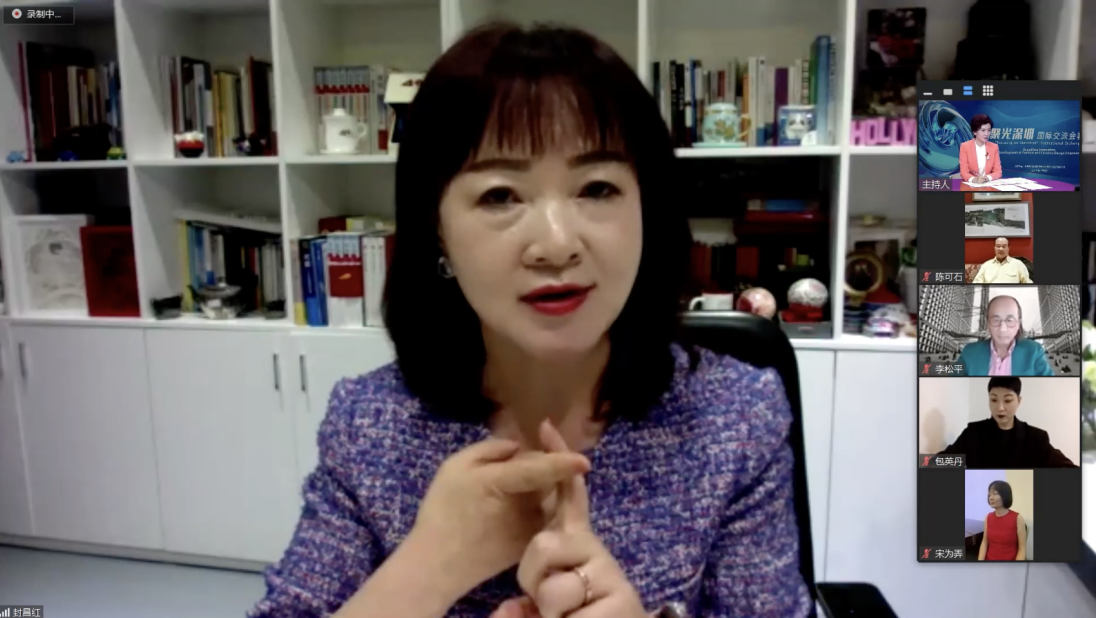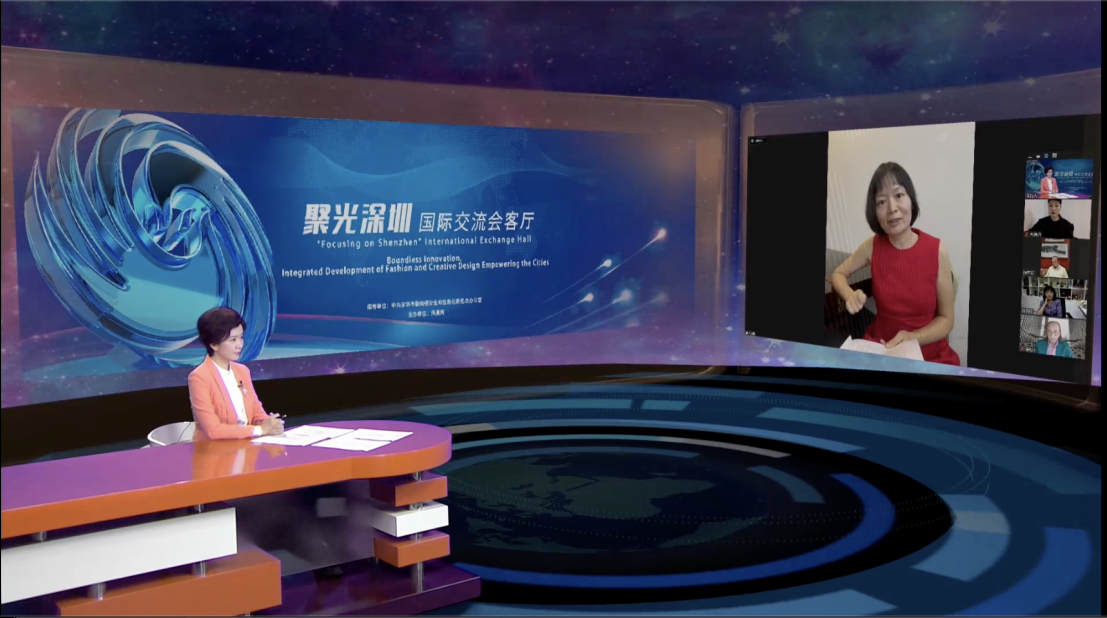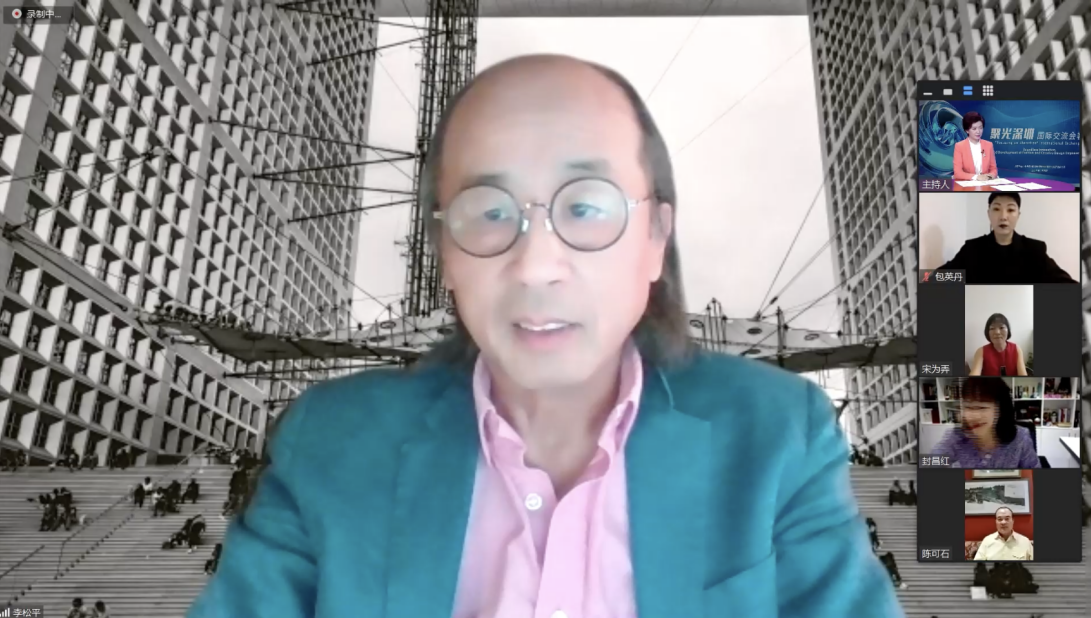|
On November 30, under the guidance of the Network Information Office of the Shenzhen Municipal Committee of the Communist Party of China, the second forum of "Focus on Shenzhen" International Exchange Conference Room, "Innovation Without Boundaries, Fashion and Creative Design Integration Development Enabling City", was launched.The event aims to create an international online communication platform with ideological, open and influential features. By focusing on Shenzhen's urban culture, public services and other areas of Shenzhen's innovative initiatives and practices, Shenzhen will exchange international experience and help enhance Shenzhen's international influence.
This forum invites Chen Keshi, a famous architect, chief designer of Zhongying Urban Design Institute, and one of the top ten architectural and cultural figures in the 40th anniversary of reform and opening up; Feng Changhong, Secretary-General of China Industrial Design Collaborative Innovation Platform, President of Shenzhen Industrial Design Industry Association, and Executive Secretary-General of Strategic Advisory Committee of Shenzhen Innovative Design Institute;Bao Yingdan, an internationally renowned curator, president of Italian Oriental Culture and Art Association, founder and CEO of Zhixuan International, and Veron Sung, a visual artist in Hong Kong;Bob Lee, chairman of Swedish Design House, discussed how creative design can enable Shenzhen's urban development, focusing on how global creative cities cultivate the soil of creative culture, the similarities and differences between Shenzhen and global creative cities, and how fashion design can be deeply integrated with technology, culture and commerce.
Revival | Chen Keshi: Urban architecture is the embodiment of natural environment and traditional culture.
Taking the life experience of living in London as an example, Chen Keshi believes that both London and Shenzhen are typical immigrant cities, which stimulate innovative vitality in a pluralistic context. He said that Shenzhen, with the strong support of national policies, has unlimited potential for development in urban cultural creativity in the future.It is believed that the development of creative design in Shenzhen can also drive the cultural construction of Guangdong-Hong Kong-Macao Greater Bay Area forward.
Chen Keshi believes that the creativity of a city needs the support of space, and that the design of urban space should be people-oriented and based on the quality of life of citizens. As a crowded big city, more pedestrian urban space should be created to meet the leisure, vacation and creative life of citizens.

From the perspective of urban architecture, he believes that Shenzhen's urban design has two important creative starting points. First, it is based on the natural geographical characteristics of Shenzhen itself. As a coastal city, Shenzhen's urban construction should highlight the characteristics of the marine city, show the vitality and cultural characteristics of the coastal city, "transparent, bright, blue sea and blue sky" is her pronoun.The two is "modern interpretation of Chinese traditional culture". " Shenzhen is a young and avant-garde city, and many Western architectural styles are reflected in Shenzhen."Chen Keshi believes that in the modern context, the splendid architectural culture inherited from China for 5000 years should be embodied and carried forward in Shenzhen, so that this rising international metropolis can show the charm of Chinese traditional architectural culture to the world.".
Co-Creation | Feng Changhong: Equality Defines Innovation and Creates a City of Maker
Talking about the significance of creativity to the development of a city, Feng Changhong interpreted it from different angles. She mentioned that any city on the earth has its own unique urban atmosphere, which comes from the cultural roots of a city.Creative design can exert a subtle influence on the style of the city, such as the details of garbage cans, seats and street lamp design in the city, which can make people feel the temperature of a city, which is the aesthetic empowerment of creativity to the city.Shenzhen's clothing, clocks and furniture industries have a solid foundation, and the development of creative design also provides more new ideas for these industries to promote the sustainable development of the industry.

Feng Changhong shared the development process of Shenzhen design from "first" to "demonstration". She said that Shenzhen has gone from integrating and creating an innovative integration of the whole industry chain to going out, benchmarking the international level, to sharing the ecology of design creativity, to everyone can participate in creativity. "Maker City" has become a shining city label in Shenzhen.Shenzhen's Reading Month and Creative December are mobilizing more people in the city to participate in creativity and stimulate the innovative vitality of a city. An equal, inclusive and characteristic city will attract more people to develop here.
Talking about how the new generation of information technology integrates with creativity, culture and commerce, Feng Changhong summed up with the key word "new". The first is fusion and fusion, which requires fusion and aggregation at the same time of cross-border integration; the second is the thinking of flexible design, which needs to find a balance between new and old industries and new and old modes;Third, fate and common, creativity is ultimately for people's yearning for a better life and burst out of new ideas, need to find symbiotic points in visual expression, business transformation and so on.
Continuity | Bao Yingdan: The Traditional Garment Industry Should Develop Towards the Goal of Sustainability
As a creative person focusing on the fashion field, Bao Yingdan has long been concerned about the sustainable development of the fashion industry. She believes that Shenzhen is a city with sustainable innovation ability, constantly attracting students from all over the world to play their talents in fashion, creativity, design and other fields. Shenzhen's tolerance of multiculturalism provides strong momentum for urban innovation and development.

Bao Yingdan pointed out that from the perspective of sustainable industrial development, saving water resources and reducing environmental pollution are also important factors for industrial transformation and development. In her view, the development of traditional garment industry needs to combine the strength of emerging young people to make the industrial transformation more in line with the demands of the new generation and the needs of the development of the times.
Fusion | Veron Sung: Combining Traditional Design with International Highlights with an Open Mind
In Veron Sung's view, creativity is a way to integrate different levels of society. A city can not only meet people's basic needs and provide material services, but also meet people's spiritual pursuit."Creative design is to tap the bright spots in different areas of life, through the collision and integration of diversified ideas, to bring innovative works full of vitality.". She believes that cities should continue to improve the protection of intellectual property rights, so that more people can be confident and bold to create and innovate.

When discussing how to combine visual art with urban space, Veron Sung said that art is everywhere. Visual art exists in all aspects of the city, a pair of skillful hands, a pair of ingenious ideas, can present these beautiful elements in the eyes of the citizens.She believes that we should continue to think and accept multiculturalism with an open mind, integrate different international artistic highlights with domestic contemporary art, and explore more possibilities of urban creative culture. With the combination of technology and innovation, innovative design is not only a technical innovation, but also a cultural aspect to find the connotation and extension of creativity itself.
People-oriented | Bob Lee: Urban planning should be people-oriented to create a livable living environment
Bob Lee talks about urban creativity from the perspective of urban planning. Taking Stockholm's urban design as an example, he introduced the characteristics of Stockholm's street design, some streets will prohibit vehicles from entering at certain times, so that people can enjoy urban life in leisure and safe space.

Bob Lee believes that "putting people first" is the philosophy of all design. Urban planning can empower urban life, enable the environment to interact positively with residents, and encourage more interaction between people.All kinds of outdoor environmental facilities in cities should abandon the solidified thinking that park facilities are mainly provided for the elderly to exercise, and meet the needs of the elderly, young people, children, infants and other groups. Bob Lee believes that this kind of design should be integrated, through better functioning of public facilities, so as to close the relationship between people in the city.
|


 Home > News >
Home > News >